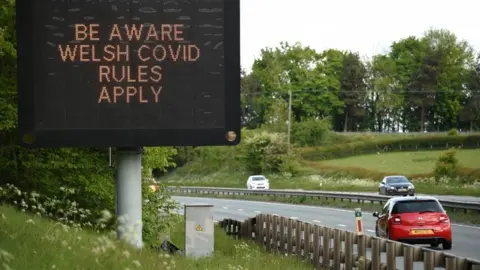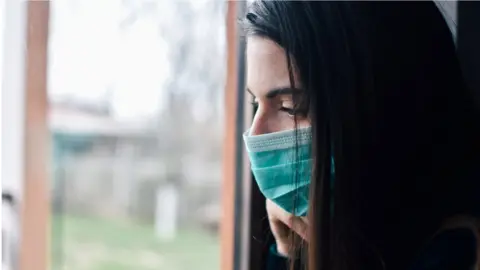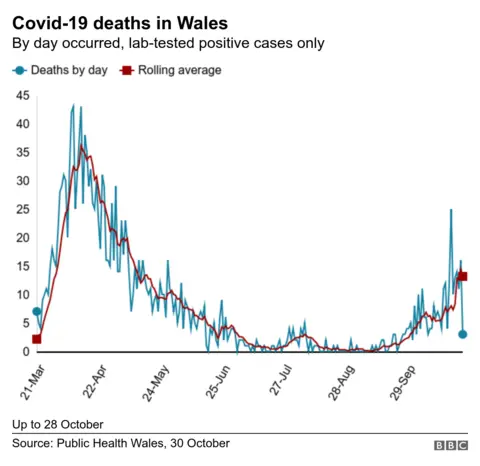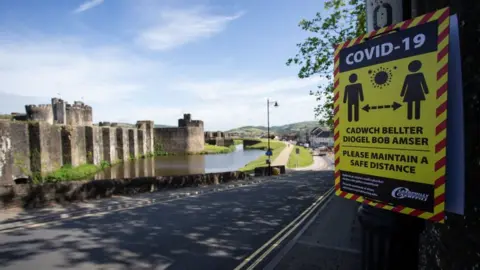Covid: Wales 'will not have local lockdowns after firebreak'
 AFP
AFPThere will not be local lockdowns after the end of Wales' 17-day firebreak, First Minister Mark Drakeford has confirmed.
Once the current Wales-wide restrictions end on 9 November, there will not be any local variations.
Bars, non-essential shops, restaurants, cafes and churches will reopen at the end of the current lockdown.
But the system of 17-separate local lockdowns will not return when new restrictions are announced on Monday.
Plaid Cymru said any new restrictions should aim to bring the R number - the rate that the virus reproduces - below 1.
Mr Drakeford told a press conference the local lockdowns had helped, but were not sufficient to deal with the "onslaught" of the virus and "didn't work well enough".
He added: "For the sake of clarity and simplicity, our decision is that the other side of the firebreak period from 9 November, we will have a set of national rules that will apply in all parts of Wales.
"I hope that that will help people in Wales, just to be clearer about what they are being asked to do.
"Because we have had evidence of people wanting to do the right thing, but not always being certain what the right thing is, because the rules have been more difficult to follow than we would have liked.
"We're going to simplify. We're going to clarify."
 Getty Images
Getty ImagesMeanwhile, he said giving false information to NHS contact tracers would become a criminal offence in Wales, with fines to be decided.
There will be a legal requirement to self-isolate if asked to do so by contact tracers and employers will be banned from preventing people from doing so.
Self-isolating social care care workers will have sick-pay topped up to full pay, Mr Drakeford promised, and payments of £500 will be given for people on low incomes who are self-isolating.
The Welsh Conservatives have criticised ministers for first announcing the £500 payment a month ago, but failing to get the scheme up and running until now.
Similar schemes in England and Scotland are already in place.
Could self-isolation period be shorter?
Chief Medical Officer Frank Atherton is considering making the length of time people have to self-isolate shorter.
Mark Drakeford said recent scientific work says "you are most infectious to somebody else in the two days before and the two days after you feel the first onset of symptoms".
"By the time seven days have gone by, you know, that level of risk to other people has gone down quite a lot", he told Capital South Wales radio.
Currently people need to self-isolate for between 10 and 14 days, depending on the circumstances.
He said community centres would be able to have "groups of up to 15 people meeting in them" over the winter when the firebreak ends on 9 November.
More will be done to encourage people to work from home after the lockdown ends, he added.

26,100 'in Wales had coronavirus'
The 17-day lockdown was introduced on 23 October to stem a rise in coronavirus cases, which have continued to increase during the lockdown.
The press conference heard there were 1,700 more confirmed infections on Friday and 1,191 patients in hospital, up 20% in a week.
"They tell us, as I said earlier, just how important, and just how necessary, this firebreak period has been," Mr Drakeford said of the figures.
"Our hope has to be that the actions we are all taking will change the course of this disease," he added, saying the weeks that follow will show "its full impact."
An estimated 26,100 people in Wales had coronavirus in the week up to 23 October, according to the Office for National Statistics.
'Key issue is still testing'
Plaid Cymru leader Adam Price said any plan for coming out of the firebreak "must aim to keep R below 1, avoiding a third wave and the need for a further national lockdown".
He said the key issue "is still testing".
"The Welsh Government must focus on optimising Wales's own testing capacity through NHS and university laboratories in order to expedite the testing process and facilitate reaching the '24-hour turnaround' timescale target."
 Getty Images
Getty ImagesTravel ban 'could continue'
The first minister said a ban implemented prior to the firebreak banning people from areas of the UK with high levels of coronavirus from entering Wales could continue after 9 November.
Under lockdown no-one can travel into Wales except for a limited set of reasons - but in the days before people from tier 2 and tier 3 areas in England, the central belt in Scotland and Northern Ireland were subject to travel restrictions.
"I will want to study, over this weekend and into next week, the comparative incidence rates between Wales and parts of England which are under tier 2 and tier 3 restrictions," Mr Drakeford told the press conference.
"The point of asking people in those places not to travel into Wales was because the rate of virus circulation in those places was so much more than it is here.
"I'm afraid there is still a significant gap between those places and Wales.
"If that remains the same, then we will expect to have a similar regime after November 9 as we had prior to October 23".
He said he would reveal on Monday whether people will be able to leave their respective counties - during local lockdowns most people in Wales were prevented from doing so.
Mr Drakeford said he would not anticipate that decision on Friday but was "acutely aware" of the impact the restrictions in the local lockdowns had had on peoples' lives.
